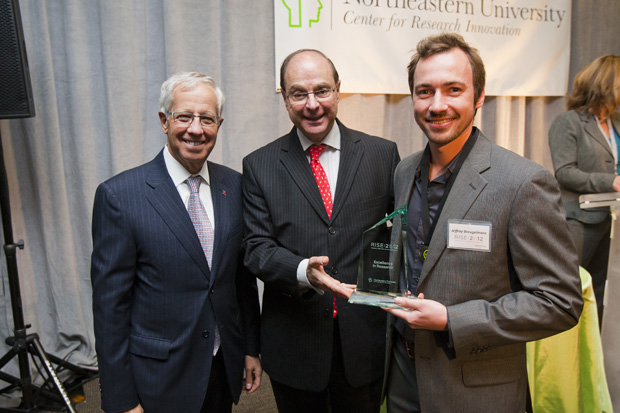Computer games without borders

Computer accessibility has become an essential part of human experience, according to Northeastern PhD candidate Jeff Breugelmans. Still, a large subset of the population cannot take advantage of its benefits due to physical limitations.
With a background in human-technology interactions, Breugelmans is working with an interdisciplinary advisory team, led by College of Engineering associate professor Yingzi Lin, to develop gaming devices and software that do not require the use of a keyboard or mouse. His dissertation research uses “innovative technologies to help those who are often overlooked,” he said.
Breugelmans’ work earned him two awards at RISE:2012 — the university’s research, innovation and scholarship expo — last month: first place in the graduate level Interdisciplinary Research category, and the prestigious RISE award in the “research” category, which earned him a $1,000 grant.
Being honored at RISE:2012, Breuglemans said, “was one of the most rewarding experiences of my academic life. I have been a part of the research expo four times now, and I always looked up to the students who won.”
In previous years, Breugelmans’ work has focused on bringing computer access to people with physical disabilities. More recently he has expanded his scope to include rehabilitation by investigating how the system can benefit a user’s health.
“Our target population has difficulties accessing computer systems due to their physical limitations,” he said. “So we take the limited ability they do possess, and adapt the computer interface to grant them access.”
These adaptations include an eye-tracking device that allows users to control the cursor merely by looking at the screen and a glove outfitted with sensors that turn subtle finger and wrist movements into computer commands that are otherwise made with mouse clicks.
These tools can be used to enhance programs underway in the Department of Physical Therapy, such as professor and chair Maura Iversen’s rheumatoid-arthritis research. “Users are performing physical therapy, possibly without even realizing it,” explained Breugelmans. Additionally, clinicians can use data collected by the sensors to track patient progress.
Breugelmans hopes that the RISE Award grant will be a good start toward securing more funds to improve his prototype. He is also planning a clinical trial with Iversen to explore the system’s rehabilitative capacity. “Running usability tests can be expensive,” he said. The grant will allow him to offer compensation for participants’ time and efforts.
Ultimately, Breugelmans wants his devices and games to provide users with relaxing and enjoyable computer experiences. That these experiences can also offer healing for people with disabilities is a bonus he is excited to continue exploring.





